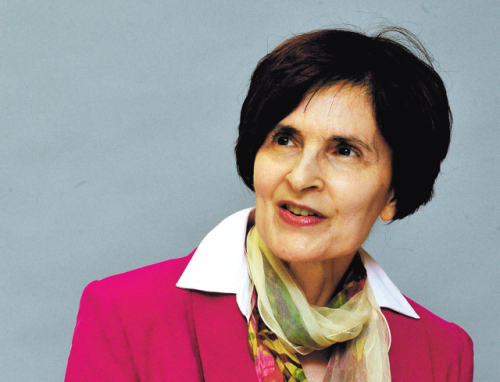American scholar publishes collection of her Korean poems
By Claire LeePublished : May 4, 2012 - 19:17
Theresa Hyun delves into the ordinary lives of Korean people
Imagine writing poetry in a foreign language, and translating it back into your mother tongue.
That’s what American scholar Theresa Hyun has done. The French, English and Korean-speaking professor, who had lived in Seoul from the early 1980s to 1992, recently published her first bilingual collection of poems, titled “A Cup of Tea at P’anmunjom (DMZ).”
“Mostly I wrote about the things that I experienced living in Korea,” Hyun told The Korea Herald during her visit to Seoul.
“I also wrote about interesting people that I met, and scenes of daily life. I was very impressed by the ordinary people in Korea.”
The scholar, who now teaches Korean studies at York University in Toronto, arrived in Seoul in the early 1980s not knowing a single word of Korean.
While teaching French literature as a regular faculty member at Kyunghee University in Seoul, she became interested in Korean literature and especially its poetry. Hyun, who received her Ph.D. in French Medieval Studies at University of Iowa, began to write poems in Korean in 1992 ― as she started participating in poetry seminars hosted by “Siwa Sihak,” a local poetry magazine.
Imagine writing poetry in a foreign language, and translating it back into your mother tongue.
That’s what American scholar Theresa Hyun has done. The French, English and Korean-speaking professor, who had lived in Seoul from the early 1980s to 1992, recently published her first bilingual collection of poems, titled “A Cup of Tea at P’anmunjom (DMZ).”
“Mostly I wrote about the things that I experienced living in Korea,” Hyun told The Korea Herald during her visit to Seoul.
“I also wrote about interesting people that I met, and scenes of daily life. I was very impressed by the ordinary people in Korea.”
The scholar, who now teaches Korean studies at York University in Toronto, arrived in Seoul in the early 1980s not knowing a single word of Korean.
While teaching French literature as a regular faculty member at Kyunghee University in Seoul, she became interested in Korean literature and especially its poetry. Hyun, who received her Ph.D. in French Medieval Studies at University of Iowa, began to write poems in Korean in 1992 ― as she started participating in poetry seminars hosted by “Siwa Sihak,” a local poetry magazine.

“(Knowing foreign languages) helps, I think,” said Hyun when asked about her experience teaching French and learning Korean at the same time at Kyunghee.
“The more foreign languages you know, the easier it is to learn different cultures. Since I had the experience of living in France and studying French poetry, I was able to, in some ways, be more receptive about learning a third language in Korea.”
Hyun’s newly published book consists of 40 poems, which she wrote in Korean. Of them, she translated 32 into English on her own.
The poems touch on everyday Korean life and ordinary people, including an old woman selling sweet potatoes on streets, visiting a family gravesite, and the scenes of busy and hectic Seoul subway during rush hours.
“Socho (Seocho), Pangpae (Bangbae), Sadang, station after station,” she writes in her poem titled “Traveling Together.”
“The queue on the day to work/ Morning newspapers inserted under arms/ The train is chockfull of spread out newspapers/ Without an inch to breathe. … Shincho’on (Shinchon), Edae, Shicho’ong (Sicheong ‘city hall’), station after station/ They’re thrown away, crumpled. They are dropped off/ Buried in work.”
Both her Korean poems and English translations capture the essence of contemporary Korea, as well as the fading traditions ― such as lives of shamans and Buddhist values.
“As we silently bow our heads in front of the graves,” she writes in “A Day at the Family Graves.”
“Mother’s white choksam (jeoksam)/ Comes to mind with the fragrance of incense. / Whispering of unfinished words can be heard./ The stained weariness of our life washes away.”
Hyun said translating her Korean poems into her mother tongue was certainly easier than writing them in Korean. One of her research interests pivots around women translators in North Korea.
“I never had any formal training (in translation),” said Hyun. “The interesting thing is that I think many people in our contemporary world are involved with translation without realizing it. We are constantly bombarded with messages and other cultures and it really means we are translating all the time.”
By Claire Lee (dyc@heraldcorp.com)


![[Exclusive] Korean military set to ban iPhones over 'security' concerns](http://res.heraldm.com/phpwas/restmb_idxmake.php?idx=644&simg=/content/image/2024/04/23/20240423050599_0.jpg&u=20240423183955)




![[Herald Interview] 'Amid aging population, Korea to invite more young professionals from overseas'](http://res.heraldm.com/phpwas/restmb_idxmake.php?idx=644&simg=/content/image/2024/04/24/20240424050844_0.jpg&u=20240424200058)

![[Pressure points] Leggings in public: Fashion statement or social faux pas?](http://res.heraldm.com/phpwas/restmb_idxmake.php?idx=644&simg=/content/image/2024/04/23/20240423050669_0.jpg&u=)








